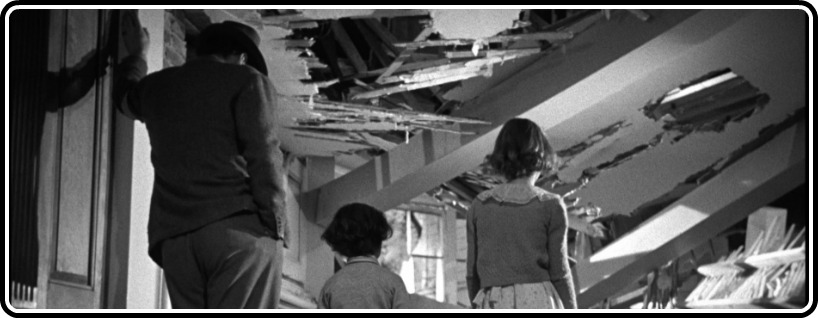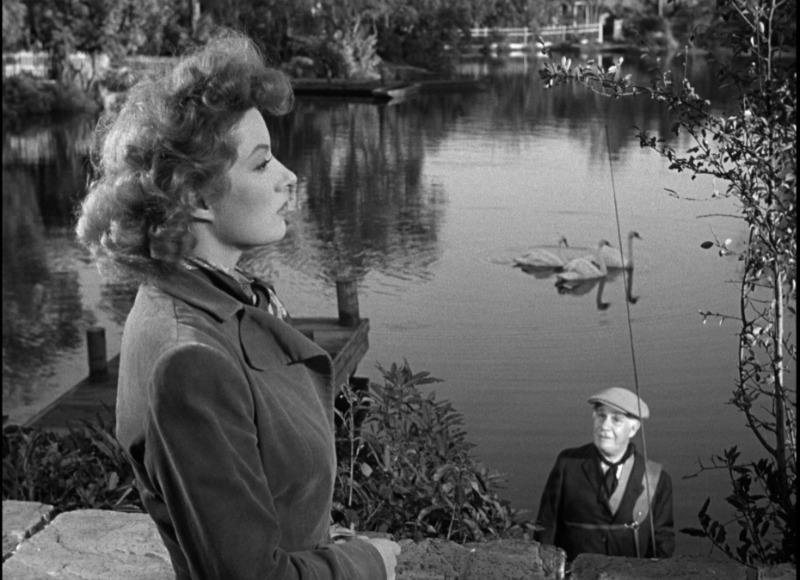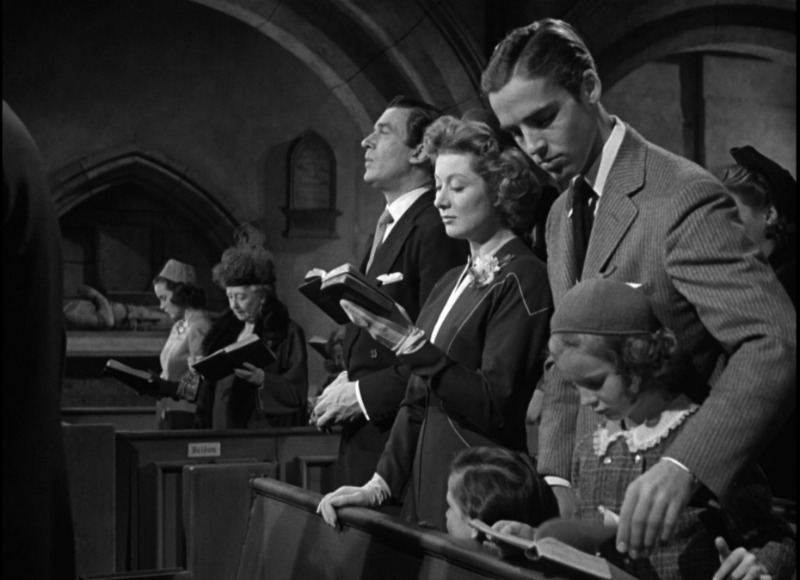
With all the modern cries of “too soon!” concerning the effort to make a film based on nearly any major event in recent history, it’s always interesting to go back and watch the many, many, many films made about World War II while the war was still very much going on – or in some cases, before the U.S. had even entered it. William Wyler’s 1942 film, Mrs. Miniver, straddles that line perhaps the closest, having gone into a somewhat extended pre-production in 1940, as the screenplay was continuously changed to reflect not only the circumstances of the war (the film formally begins in early 1939), but also the changing attitudes in the United States towards the plight of the British. The film was finished in 1942, only a few months after the U.S. entered the war, and President Roosevelt himself ordered the film to be rushed to theaters by June of 1942 purely for purposes of propaganda. William Wyler himself, a German immigrant, admitted to making the film for propaganda purposes, feeling that if ordinary Americans saw for themselves the extent of hardship that their British counterparts were experiencing, they would rally behind the war effort.
Everyone’s gambit paid off, in more ways than one. Winston Churchill stated that the film did more for the war effort than a fleet of destroyers, grossed nearly $9 million worldwide (making it the number one attraction in the U.S.), won six Academy Awards (Actress, Supporting Actress, Picture, Director, Black-and-White Cinematography, and Screenplay) among twelve nominations, and of the 592 film critics polled by Film Daily, 555 named it the best film of the year. It was a phenomenon, as firmly ingrained in that period of Western culture as anything could be, and in that sense, it would be irresponsible to not consider this vantage point in viewing the film today.

Don’t get me wrong, the film stands up mighty fine on its own, so long as one accepts the sort of “all in this together” sentiment with which the film operates, and the blatant manipulation of its dramatic devices (but really, if we’re not going to the movies to be manipulated, what’s the point). While it’s somewhat bogged down by a well-intentioned, but ultimately distracting subplot involving a flower competition (which doesn’t exactly bolster the film’s intent to show the hardship of life for the British), it’s more than functional as a look at how something as massive as World War II affected one family (Greer Garson plays the titular matriarch, with Walter Pidgeon as her husband) and the village in which they lived, and often (still) a very emotional experience. But when viewing it through the lens of a 1942 audience, it’s almost overwhelming, bringing alarming urgency to a conflict many regarded as a European one. And even for someone such as myself, who’s more than a little ambivalent about Wyler as a filmmaker, this again shows that when he’s really in his element, he can manage socially engaged melodrama with the best of them.
Bringing that award-winning cinematography to Blu-ray, Warner Brothers have done a grand job in rendering the nitrate element in high definition. Fine grain is present, though never overwhelming, while the picture gives just enough depth to sell the illusion of the set-bound film’s replication of the countryside. The film rarely calls for heavy blacks or other insistent contrast, but it’s nicely handled nonetheless, and the whole thing has the kind of integrity one has always been accustomed to with 35mm, and is warmly growing so with regard to Blu-ray. The screencaps (courtesy of DVD Beaver) have been resized and compressed, but are fairly representative, taking into account the movement of the grain. The film is presented in its original aspect ratio, 1.37:1. Sound is likewise solid, and I could find little fault in its rendering of the many sounds of war.

The special features will enable one to practically recreate a propaganda-filled evening of wartime cinema. On the shorter end, you get a minute-long newsreel showing a portion of Greer Garson’s record-setting five-and-a-half-minute acceptance speech (and you thought the Oscars were long now) upon winning Best Actress at the 1943 Academy Awards, and a Tex Avery cartoon putting the story of the three little pigs into a wartime setting (with the Big Bad Wolf as Hitler), suggesting that the best defense against the enemy is preparedness (the analogy works pretty well, actually). And to extend the evening a little further, MGM shorts Mr. Blabbermouth! and For the Common Defense take a look at how rumors undermine the war effort and cooperation amongst nations strengthens it, respectively. Each run in the 20-minute range.
While the film is unabashedly a piece a propaganda, it nonetheless communicates its central themes of strong resolve in the face of the enemy with an absolute conviction that I found impossible to resist. This is the kind of old-fashioned picture you go to with the hope of experience a range of emotion – you’ll laugh! you’ll cry! you’ll cheer! – that is hardly found in the cinema today, but for which people once turned out in droves. And seeing this film, even now, seventy years on it’s easy to see why. Warner’s new Blu-ray presents the picture marvelously, and while it would have been nice to get some special features concerning the film itself, those we do get are a nice use of this element of home video, to round out the context of the film and expand on its themes and goals.



![Bergman Island (The Criterion Collection) [Blu-ray]](https://criterioncast.com/wp-content/uploads/2022/11/bergman-island-the-criterion-collection-blu-ray-400x496.jpg)
![This Is Not a Burial, It’s a Resurrection (The Criterion Collection) [Blu-ray]](https://criterioncast.com/wp-content/uploads/2022/11/this-is-not-a-burial-its-a-resurrection-the-criterion-collection-blu-ray-400x496.jpg)
![Lars von Trier's Europe Trilogy (The Criterion Collection) [The Element of Crime/Epidemic/Europa] [Blu-ray]](https://criterioncast.com/wp-content/uploads/2022/11/lars-von-triers-europe-trilogy-the-criterion-collection-the-element-of-400x496.jpg)
![Imitation of Life (The Criterion Collection) [Blu-ray]](https://criterioncast.com/wp-content/uploads/2022/11/imitation-of-life-the-criterion-collection-blu-ray-400x496.jpg)
![The Adventures of Baron Munchausen (The Criterion Collection) [4K UHD]](https://criterioncast.com/wp-content/uploads/2022/11/the-adventures-of-baron-munchausen-the-criterion-collection-4k-uhd-400x496.jpg)
![Cooley High [Criterion Collection] [Blu-ray] [1975]](https://criterioncast.com/wp-content/uploads/2022/11/cooley-high-criterion-collection-blu-ray-1975-400x496.jpg)